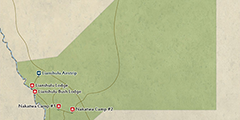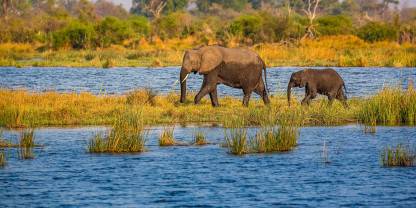Mudumu National Park is an adventurous safari destination in the Zambezi Region (formerly Caprivi Strip). The park has suffered from heavy poaching but is recovering slowly. Wildlife densities are still low, but a good variety of resident and migrating animals make a visit worthwhile. You probably wouldn’t cross the country just for Mudumu, but it should definitely be on your itinerary if you’re in the area. Self-drive visitors need to be well-prepared.

-
Best Time To Go
- May to September (Animals come to water)
-
High Season
- July to October (The park never gets crowded)
-
Size
- 1,010km² / 390mi²
-
Altitude
-
945-966m /3,100-3,169ft
 View Photos
View Photos
 View Photos
+10
Photos
View Photos
+10
Photos
 Open Map
Open Map
Pros & Cons
- Good sightings of elephant and buffalo (the latter is not common elsewhere in Namibia)
- Little visited and remote
- Limited accommodations
- Low wildlife densities
- No facilities
- The tracks in the park are often in poor condition
Wildlife
There are good numbers of buffalo and elephant in the park. Of the big cats, lion is most often encountered, but still very rare. Several species have been re-introduced, including giraffe, eland and the majestic sable antelope. The wet environment also supports water-adapted antelopes such as sitatunga and red lechwe.
More about Mudumu’s wildlifeScenery
The park has a mix of wetland and woodland. Papyrus swamps are a specialized habitat for many species, and the is where you’ll see the larger herds. Sausage trees, leadwood, figs and teak are just some of the trees decorating the landscape.
Activities
If you’re staying at the park’s only lodge, Lianshulu Bush Lodge, you can enjoy guided as well as boat excursions on the Kwando River. If you’re self-driving, self-guided game drives will be your only option. However, you need to be entirely self-sufficient, have a decent map and be prepared for some difficult ‘road’ conditions, especially during the Wet season (November to April).
Weather & Climate
Summer in Mudumu runs from November to April and coincides with the Wet season, while winter extends from May to October and marks the Dry season. Wet weather is rarely constant here, even in the higher-rainfall months of the Wet season. However, road conditions are poor after heavy rain. The warm days of the Dry season are best for exploration (with the exception of October, which can be unbearably hot).
More about the weather and climateBest Time To Visit
Animals gather at the permanent during the Dry season (May to October), making the most of the reliable water supply. You’ll pay high-season prices to see them, but without the large crowds you might encounter at other parks. The months from May to September have the ideal conditions for visiting. During the Wet season (November to April), the remaining animals tend to disappear into the thick vegetation.
More about the best time to visit



